Unit 10 I'd like some noodles. Section A(3a~3c)课件(共34张PPT)
文档属性
| 名称 | Unit 10 I'd like some noodles. Section A(3a~3c)课件(共34张PPT) |  | |
| 格式 | pptx | ||
| 文件大小 | 3.8MB | ||
| 资源类型 | 教案 | ||
| 版本资源 | 人教新目标(Go for it)版 | ||
| 科目 | 英语 | ||
| 更新时间 | 2024-02-29 10:02:20 | ||
图片预览

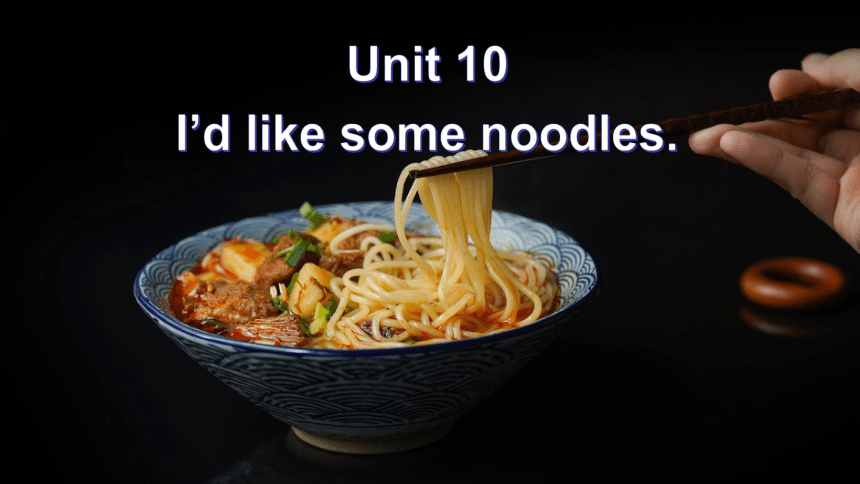
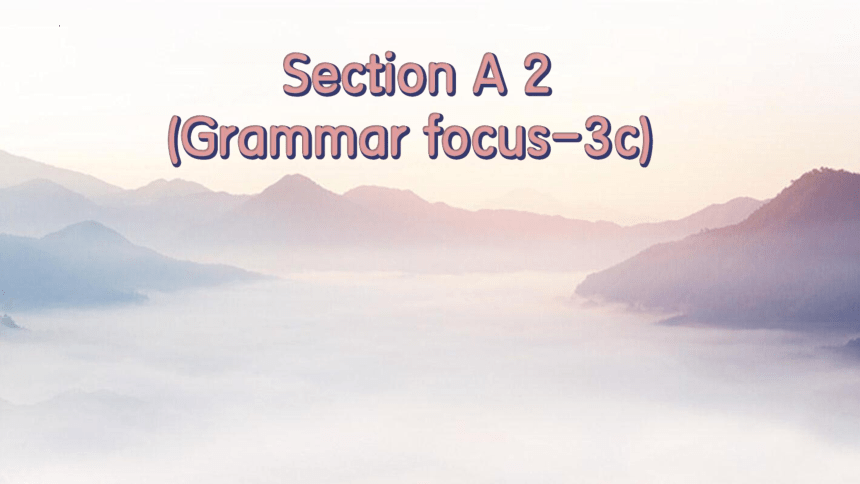


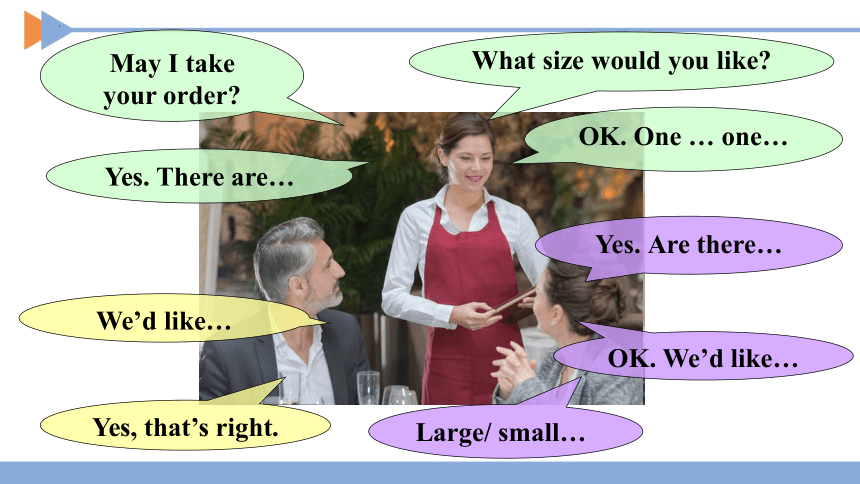
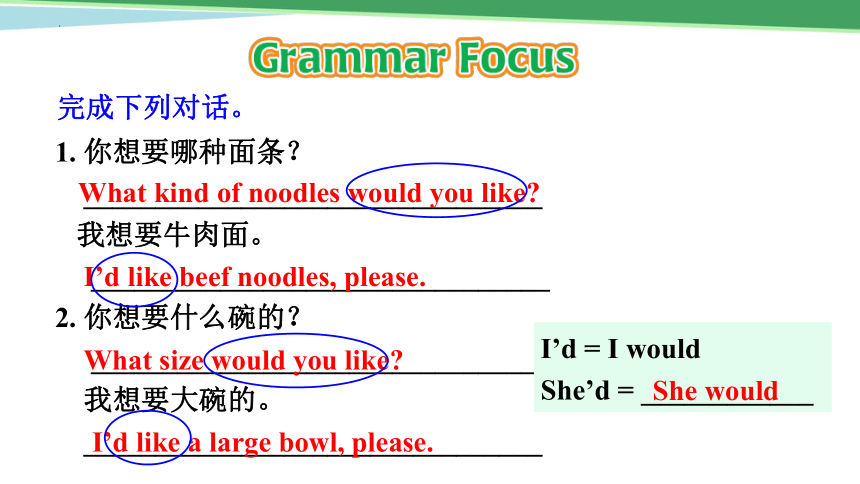

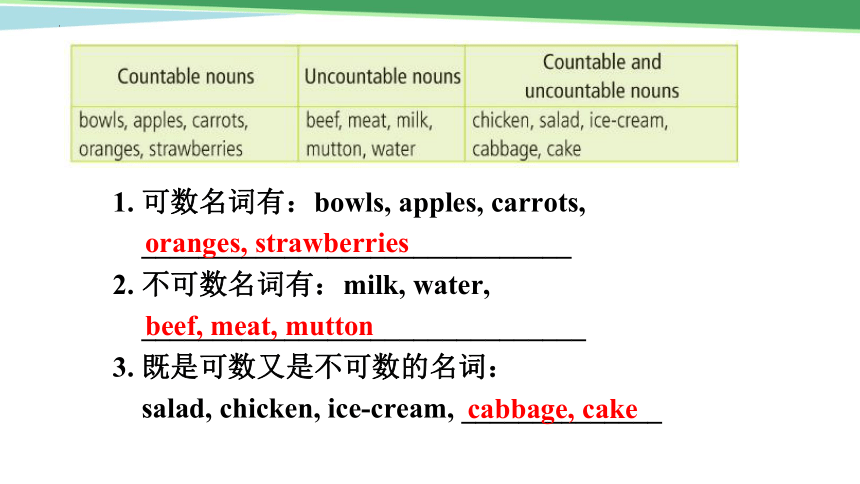
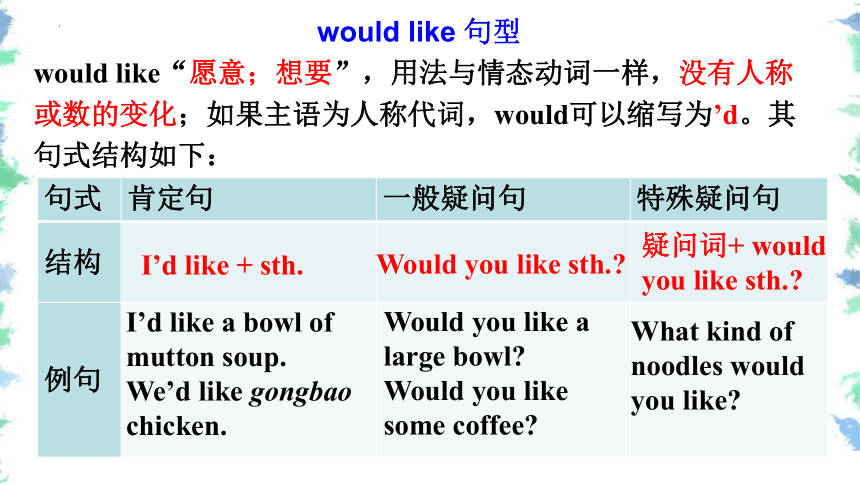

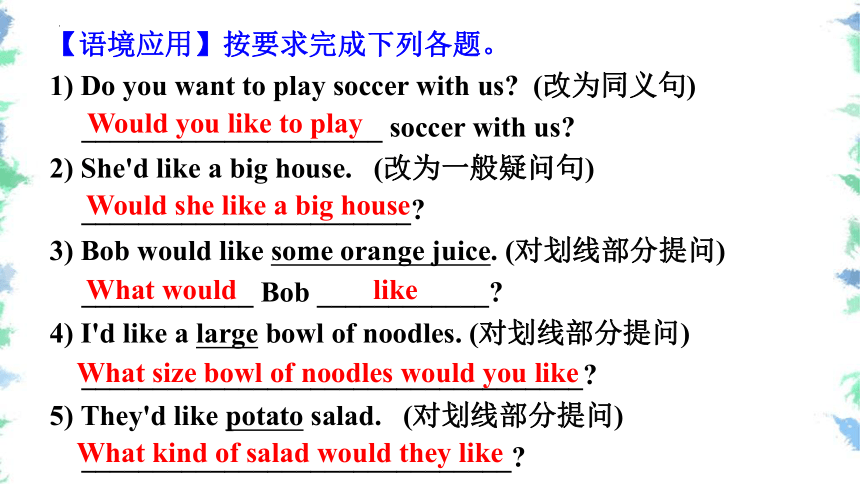
文档简介
(共34张PPT)
Unit 10
Unit 10
I’d like some noodles.
To learn to use would like;
To learn to use any and some;
To learn to distinguish (区别) and use countable and uncountable nouns about food.
What would you like
I’m not sure yet. Are there…
Yes, there are …
OK. I’d like…
May I take your order
Yes. Are there…
What size would you like
OK. We’d like…
Yes, that’s right.
Large/ small…
We’d like…
Yes. There are…
OK. One … one…
1. 你想要哪种面条?
________________________________
我想要牛肉面。________________________________
2. 你想要什么碗的?________________________________
我想要大碗的。
________________________________
完成下列对话。
I’d like beef noodles, please.
What kind of noodles would you like
What size would you like
I’d like a large bowl, please.
I’d = I would
She’d = ____________
She would
3. 你想要大碗的吗?
_______________________________
是的。
_______________________________
Would you like a large bowl
Yes, please.
4. 西红柿鸡蛋汤里有肉吗
_______________________________________
不,没有。
__________________________________
No, there isn’t any. /No, there’s no meat.
Is there any meat in the tomato and egg soup
meat n. (可食用的)肉
1. 可数名词有:bowls, apples, carrots,
______________________________
2. 不可数名词有:milk, water,
_______________________________
3. 既是可数又是不可数的名词:
salad, chicken, ice-cream, ______________
cabbage, cake
beef, meat, mutton
oranges, strawberries
would like 句型
would like“愿意;想要”,用法与情态动词一样,没有人称或数的变化;如果主语为人称代词,would可以缩写为’d。其句式结构如下:
句式 肯定句 一般疑问句 特殊疑问句
结构
例句
I’d like + sth.
I’d like a bowl of mutton soup.
We’d like gongbao chicken.
Would you like sth.
Would you like a large bowl
Would you like some coffee
疑问词+ would you like sth.
What kind of noodles would you like
句式 一般疑问句 特殊疑问句
回答
例句
Yes, please.
No, thanks.
—Would you like a sandwich
—Yes, please.
I’d like …
—What would you like to have
—I’d like a hamburger and a Coke.
【语境应用】按要求完成下列各题。
1) Do you want to play soccer with us (改为同义句)
_____________________ soccer with us
2) She'd like a big house. (改为一般疑问句)
_______________________
3) Bob would like some orange juice. (对划线部分提问)
____________ Bob ____________
4) I'd like a large bowl of noodles. (对划线部分提问)
___________________________________
5) They'd like potato salad. (对划线部分提问)
______________________________
Would you like to play
Would she like a big house
What would like
What size bowl of noodles would you like
What kind of salad would they like
some和any的用法
some和any都可修饰复数可数名词或不可数名词,表示不确定的数量。
some 一些。多用于肯定句。用于疑问句中,表示请求、建议,期望对方肯定的答复,以示礼貌。
e.g. John has some questions to ask you.
Will you have some tea
any 任何。一般用于否定句和疑问句中。
e.g. She didn’t eat any meat for dinner.
Are there any stamps in that drawer (抽屉)
【拓展】
any也可用于肯定句中,表示“任何一个”,后常接单数可数名词。
e.g. Any book is OK. I don’t mind (介意).
【语境应用】根据句意,选用some或any填空。
1) Go to the supermarket and buy ______ vegetables.
2) There aren’t ______ interesting books there.
3) Do you have ______ money
4) ______ teacher here is good.
5) Would you like ______ rice
some
any
any
Any
some
可数名词与不可数名词
可数名词:
1. 可以计数的事物的名词。(大多数水果、蔬菜属于可数名词)
2. 有单、复数形式之分。其复数形式一般要加-s或-es。
如: apple — apples
tomato — tomatoes
3. 可以直接用不定冠词a/an或具体的数词如one, two, three等来修饰。其作主语时,谓语动词的形式根据名词的数进行变化。如:
A cup is on the table.
Three cups are on the table.
不可数名词:
1. 不可以计数的事物的名词。(主食、肉类、饮料多属于不可数名词)
2. 没有复数形式,但有量的变化。
3. 不能使用不定冠词或数词直接修饰,如要表示确切数量时,用“a / an或数词 + 表示量的名词(有单、复数形式变化) + of +不可数名词”。如:
two glasses of juice 两杯果汁
three bowls of rice 三碗米饭
4. 不可数名词作主语时,谓语动词只能用单数形式。如:
碗里有一些羊肉汤。
There is some mutton soup in the bowl.
【拓展】
如果不可数名词前有表示量的复数名词短语修饰时,谓语动词须用复数形式。如:
房间里有两袋大米。
There are two bags of rice in the room.
a glass 一个玻璃杯
a chicken 一只鸡
a fish 一条鱼
a room 一个房间
an orange 一个橙子
有些名词既可作可数名词,也可作不可数名词,但意义上不同。
glass 玻璃
chicken 鸡肉
fish 鱼肉
room 空间
orange 橙汁
Ⅰ. 汉译英。
1. 一个土豆 _________________
2. 一盒牛奶 _________________
3. 两双鞋 _________________
4. 五本书 _________________
5. 一些橙汁 _________________
6. 七碗米饭 _________________
7. 三杯茶 _________________
8. 许多肉 _________________
9. 四颗卷心菜 _________________
a potato
a box of milk
two pairs of shoes
five books
some orange juice
seven bowls of rice
three cups of tea
much / a lot of / lots of meat
four cabbages
Ⅱ. 根据所给单词的提示填空。
1. I’m hungry (饥饿的). May I have some _______(cake)
2. Here are two birthday _______(cake), one for Sally and the other for Nina.
3. The _______(chicken) in this burger tastes good.
4. I can see many _________(chicken) running around in the village.
cake
cakes
chicken
chickens
1. May I have your order ____
2. What kind of noodles would you like
3. We have beef, chicken, mutton, cabbage, potato, tomato … ____
4. Yes, there are some carrots. ____
5. Sure. What size would you like ____
6. We have large, medium and small bowls. ____
a. What kind of noodles do you have
b. Oh, a medium bowl, please.
c. OK, I’d like the mutton noodles then.
d. I’d like some noodles, please.
e. What sizes do you have
f. Are there any vegetables in the mutton noodles
1. May I have your order ___
2. What kind of noodles would you like ___
3. We have beef, chicken, mutton, cabbage, potato, tomato … ___
4. Yes, there are some carrots. ____
5. Sure. What size would you like ____
6. We have large, medium and small bowls. ____
a
d
f
c
e
b
a. What kind of noodles do you have
b. Oh, a medium bowl, please.
c. OK, I’d like the mutton noodles then.
d. I’d like some noodles, please.
e. What sizes do you have
f. Are there any vegetables in the mutton noodles
Complete the conversation below.
Suppose (假设) you are the waiter (服务员) and your partner is the customer (顾客). Role-play the conversation.
Waiter: May I have your order
Customer: I’d like some …, please.
Waiter: What kind of …would you like
Customer: What kind of …do you have
…
1. What kind of noodles would you like (kind) _________________________________________ (chicken /beef/tomatoes)
2. _________________________________________ (size)
_________________________________________ (medium)
3. ____________________________________(any/cabbage/beef noodles)
_________________________________________ (no)
Write questions and answers using the words in brackets.
I’d like chicken and beef noodles with tomatoes.
What size would you like
Is there any cabbage in the beef noodles
I’d like a medium bowl, please.
No, there isn’t any.
Work in small groups. Who would like the food below Write their names on the cards above the food.
Anna, what would you like to eat
I’d like beef noodles with carrots.
A: Let me see… I’d like beef and carrot noodles because I love noodles.
B: Well, I’d like some hamburgers because I hate vegetables.
C: Oh, I’d like tomato and egg rice because it looks delicious.
D: Well, I’d like potato salad because I want healthy food.
What would you like to eat
— What kind of noodles would you like
— I’d like …
— What size would you like
— I’d like …
— Would you like a … bowl
— Yes, please.
— Is there any … in the …
— No, there isn’t any. / No, there’s no …
Countable nouns:
bowls, apples, carrots, oranges, strawberries
Uncountable nouns:
beef, meat, milk, mutton, water
Countable and uncountable nouns:
chicken, salad, ice-cream, cabbage, cake
Ⅰ. 根据语境,用括号内所给名词的适当形式填空。
1. There isn't any _______(porridge) in the restaurant.
2. Many _______(child) are playing in the park.
3. I need to buy two boxes of _______(milk) for breakfast.
4. Mom usually buys some vegetables and _______(meat) after work.
5. There's some _______(cabbage) in the baozi.
6. Those _______(animal) are in danger. Let's save them.
7. We'd like three cups of _______(tea), please.
porridge
children
milk
meat
cabbage
animals
tea
Ⅱ. 根据括号内的要求完成下列各题,每空一词(含缩略形式)。
1. Tom wants to be a teacher. (改为同义句)
Tom _______ _______ _______ _______ a teacher.
2. There isn't any bread in the box. (改为同义句)
_______ _______ bread in the box.
3. There is some water in the bowl. (改为一般疑问句)
_______ _______ _______ _______ in the bowl
4. I'd like some milk. (改为一般疑问句)
_______ _______ _______ some milk
5. Susan likes fruit salad. (对划线部分提问)
_______ _______ _______ _______ does Susan like
would like to be
There's no
Is there any water
Would you like
What kind of salad
将3c中的对话内容改写成一段英语汇报。例如:
In my group, Sally and Tom would like some hamburgers. Anna and Jim would like tomato and egg rice. Nobody would like potato salad.
Unit 10
Unit 10
I’d like some noodles.
To learn to use would like;
To learn to use any and some;
To learn to distinguish (区别) and use countable and uncountable nouns about food.
What would you like
I’m not sure yet. Are there…
Yes, there are …
OK. I’d like…
May I take your order
Yes. Are there…
What size would you like
OK. We’d like…
Yes, that’s right.
Large/ small…
We’d like…
Yes. There are…
OK. One … one…
1. 你想要哪种面条?
________________________________
我想要牛肉面。________________________________
2. 你想要什么碗的?________________________________
我想要大碗的。
________________________________
完成下列对话。
I’d like beef noodles, please.
What kind of noodles would you like
What size would you like
I’d like a large bowl, please.
I’d = I would
She’d = ____________
She would
3. 你想要大碗的吗?
_______________________________
是的。
_______________________________
Would you like a large bowl
Yes, please.
4. 西红柿鸡蛋汤里有肉吗
_______________________________________
不,没有。
__________________________________
No, there isn’t any. /No, there’s no meat.
Is there any meat in the tomato and egg soup
meat n. (可食用的)肉
1. 可数名词有:bowls, apples, carrots,
______________________________
2. 不可数名词有:milk, water,
_______________________________
3. 既是可数又是不可数的名词:
salad, chicken, ice-cream, ______________
cabbage, cake
beef, meat, mutton
oranges, strawberries
would like 句型
would like“愿意;想要”,用法与情态动词一样,没有人称或数的变化;如果主语为人称代词,would可以缩写为’d。其句式结构如下:
句式 肯定句 一般疑问句 特殊疑问句
结构
例句
I’d like + sth.
I’d like a bowl of mutton soup.
We’d like gongbao chicken.
Would you like sth.
Would you like a large bowl
Would you like some coffee
疑问词+ would you like sth.
What kind of noodles would you like
句式 一般疑问句 特殊疑问句
回答
例句
Yes, please.
No, thanks.
—Would you like a sandwich
—Yes, please.
I’d like …
—What would you like to have
—I’d like a hamburger and a Coke.
【语境应用】按要求完成下列各题。
1) Do you want to play soccer with us (改为同义句)
_____________________ soccer with us
2) She'd like a big house. (改为一般疑问句)
_______________________
3) Bob would like some orange juice. (对划线部分提问)
____________ Bob ____________
4) I'd like a large bowl of noodles. (对划线部分提问)
___________________________________
5) They'd like potato salad. (对划线部分提问)
______________________________
Would you like to play
Would she like a big house
What would like
What size bowl of noodles would you like
What kind of salad would they like
some和any的用法
some和any都可修饰复数可数名词或不可数名词,表示不确定的数量。
some 一些。多用于肯定句。用于疑问句中,表示请求、建议,期望对方肯定的答复,以示礼貌。
e.g. John has some questions to ask you.
Will you have some tea
any 任何。一般用于否定句和疑问句中。
e.g. She didn’t eat any meat for dinner.
Are there any stamps in that drawer (抽屉)
【拓展】
any也可用于肯定句中,表示“任何一个”,后常接单数可数名词。
e.g. Any book is OK. I don’t mind (介意).
【语境应用】根据句意,选用some或any填空。
1) Go to the supermarket and buy ______ vegetables.
2) There aren’t ______ interesting books there.
3) Do you have ______ money
4) ______ teacher here is good.
5) Would you like ______ rice
some
any
any
Any
some
可数名词与不可数名词
可数名词:
1. 可以计数的事物的名词。(大多数水果、蔬菜属于可数名词)
2. 有单、复数形式之分。其复数形式一般要加-s或-es。
如: apple — apples
tomato — tomatoes
3. 可以直接用不定冠词a/an或具体的数词如one, two, three等来修饰。其作主语时,谓语动词的形式根据名词的数进行变化。如:
A cup is on the table.
Three cups are on the table.
不可数名词:
1. 不可以计数的事物的名词。(主食、肉类、饮料多属于不可数名词)
2. 没有复数形式,但有量的变化。
3. 不能使用不定冠词或数词直接修饰,如要表示确切数量时,用“a / an或数词 + 表示量的名词(有单、复数形式变化) + of +不可数名词”。如:
two glasses of juice 两杯果汁
three bowls of rice 三碗米饭
4. 不可数名词作主语时,谓语动词只能用单数形式。如:
碗里有一些羊肉汤。
There is some mutton soup in the bowl.
【拓展】
如果不可数名词前有表示量的复数名词短语修饰时,谓语动词须用复数形式。如:
房间里有两袋大米。
There are two bags of rice in the room.
a glass 一个玻璃杯
a chicken 一只鸡
a fish 一条鱼
a room 一个房间
an orange 一个橙子
有些名词既可作可数名词,也可作不可数名词,但意义上不同。
glass 玻璃
chicken 鸡肉
fish 鱼肉
room 空间
orange 橙汁
Ⅰ. 汉译英。
1. 一个土豆 _________________
2. 一盒牛奶 _________________
3. 两双鞋 _________________
4. 五本书 _________________
5. 一些橙汁 _________________
6. 七碗米饭 _________________
7. 三杯茶 _________________
8. 许多肉 _________________
9. 四颗卷心菜 _________________
a potato
a box of milk
two pairs of shoes
five books
some orange juice
seven bowls of rice
three cups of tea
much / a lot of / lots of meat
four cabbages
Ⅱ. 根据所给单词的提示填空。
1. I’m hungry (饥饿的). May I have some _______(cake)
2. Here are two birthday _______(cake), one for Sally and the other for Nina.
3. The _______(chicken) in this burger tastes good.
4. I can see many _________(chicken) running around in the village.
cake
cakes
chicken
chickens
1. May I have your order ____
2. What kind of noodles would you like
3. We have beef, chicken, mutton, cabbage, potato, tomato … ____
4. Yes, there are some carrots. ____
5. Sure. What size would you like ____
6. We have large, medium and small bowls. ____
a. What kind of noodles do you have
b. Oh, a medium bowl, please.
c. OK, I’d like the mutton noodles then.
d. I’d like some noodles, please.
e. What sizes do you have
f. Are there any vegetables in the mutton noodles
1. May I have your order ___
2. What kind of noodles would you like ___
3. We have beef, chicken, mutton, cabbage, potato, tomato … ___
4. Yes, there are some carrots. ____
5. Sure. What size would you like ____
6. We have large, medium and small bowls. ____
a
d
f
c
e
b
a. What kind of noodles do you have
b. Oh, a medium bowl, please.
c. OK, I’d like the mutton noodles then.
d. I’d like some noodles, please.
e. What sizes do you have
f. Are there any vegetables in the mutton noodles
Complete the conversation below.
Suppose (假设) you are the waiter (服务员) and your partner is the customer (顾客). Role-play the conversation.
Waiter: May I have your order
Customer: I’d like some …, please.
Waiter: What kind of …would you like
Customer: What kind of …do you have
…
1. What kind of noodles would you like (kind) _________________________________________ (chicken /beef/tomatoes)
2. _________________________________________ (size)
_________________________________________ (medium)
3. ____________________________________(any/cabbage/beef noodles)
_________________________________________ (no)
Write questions and answers using the words in brackets.
I’d like chicken and beef noodles with tomatoes.
What size would you like
Is there any cabbage in the beef noodles
I’d like a medium bowl, please.
No, there isn’t any.
Work in small groups. Who would like the food below Write their names on the cards above the food.
Anna, what would you like to eat
I’d like beef noodles with carrots.
A: Let me see… I’d like beef and carrot noodles because I love noodles.
B: Well, I’d like some hamburgers because I hate vegetables.
C: Oh, I’d like tomato and egg rice because it looks delicious.
D: Well, I’d like potato salad because I want healthy food.
What would you like to eat
— What kind of noodles would you like
— I’d like …
— What size would you like
— I’d like …
— Would you like a … bowl
— Yes, please.
— Is there any … in the …
— No, there isn’t any. / No, there’s no …
Countable nouns:
bowls, apples, carrots, oranges, strawberries
Uncountable nouns:
beef, meat, milk, mutton, water
Countable and uncountable nouns:
chicken, salad, ice-cream, cabbage, cake
Ⅰ. 根据语境,用括号内所给名词的适当形式填空。
1. There isn't any _______(porridge) in the restaurant.
2. Many _______(child) are playing in the park.
3. I need to buy two boxes of _______(milk) for breakfast.
4. Mom usually buys some vegetables and _______(meat) after work.
5. There's some _______(cabbage) in the baozi.
6. Those _______(animal) are in danger. Let's save them.
7. We'd like three cups of _______(tea), please.
porridge
children
milk
meat
cabbage
animals
tea
Ⅱ. 根据括号内的要求完成下列各题,每空一词(含缩略形式)。
1. Tom wants to be a teacher. (改为同义句)
Tom _______ _______ _______ _______ a teacher.
2. There isn't any bread in the box. (改为同义句)
_______ _______ bread in the box.
3. There is some water in the bowl. (改为一般疑问句)
_______ _______ _______ _______ in the bowl
4. I'd like some milk. (改为一般疑问句)
_______ _______ _______ some milk
5. Susan likes fruit salad. (对划线部分提问)
_______ _______ _______ _______ does Susan like
would like to be
There's no
Is there any water
Would you like
What kind of salad
将3c中的对话内容改写成一段英语汇报。例如:
In my group, Sally and Tom would like some hamburgers. Anna and Jim would like tomato and egg rice. Nobody would like potato salad.
同课章节目录
- Unit 1 Can you play the guitar?
- Section A
- Section B
- Unit 2 What time do you go to school?
- Section A
- Section B
- Unit 3 How do you get to school?
- Section A
- Section B
- Unit 4 Don't eat in class.
- Section A
- Section B
- Unit 5 Why do you like pandas?
- Section A
- Section B
- Unit 6 I'm watching TV.
- Section A
- Section B
- Review of Units 1-6
- Unit 7 It's raining!
- Section A
- Section B
- Unit 8 Is there a post office near here?
- Section A
- Section B
- Unit 9 What does he look like?
- Section A
- Section B
- Unit 10 I'd like some noodles.
- Section A
- Section B
- Unit 11 How was your school trip?
- Section A
- Section B
- Unit 12 What did you do last weekend?
- Section A
- Section B
